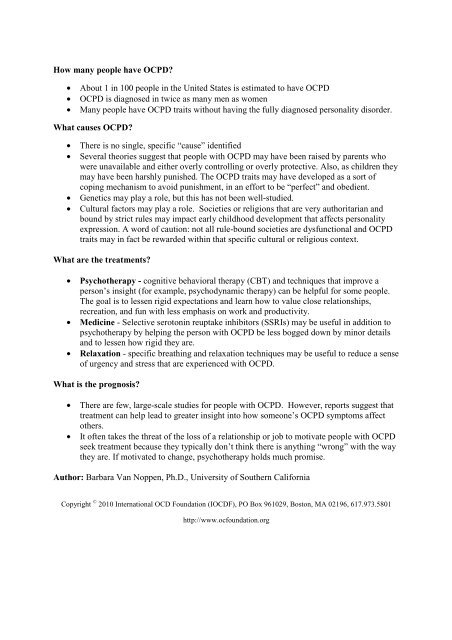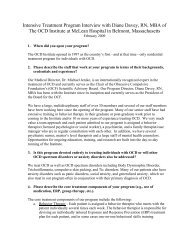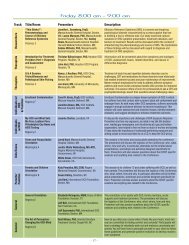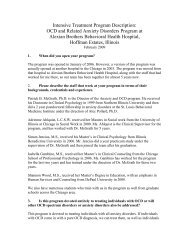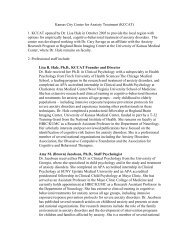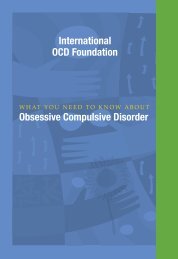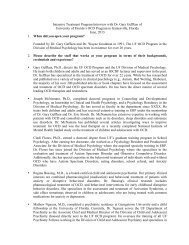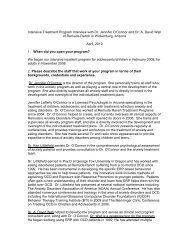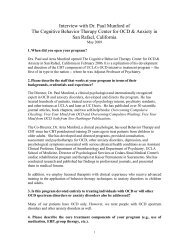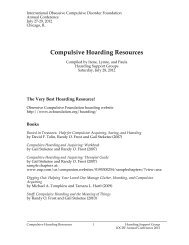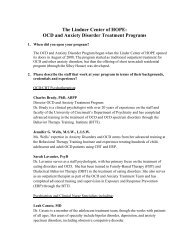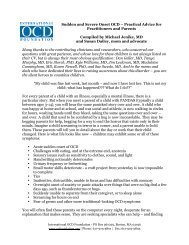OCPD Fact Sheet - Obsessive Compulsive Foundation
OCPD Fact Sheet - Obsessive Compulsive Foundation
OCPD Fact Sheet - Obsessive Compulsive Foundation
Create successful ePaper yourself
Turn your PDF publications into a flip-book with our unique Google optimized e-Paper software.
How many people have <strong>OCPD</strong>?• About 1 in 100 people in the United States is estimated to have <strong>OCPD</strong>• <strong>OCPD</strong> is diagnosed in twice as many men as women• Many people have <strong>OCPD</strong> traits without having the fully diagnosed personality disorder.What causes <strong>OCPD</strong>?• There is no single, specific “cause” identified• Several theories suggest that people with <strong>OCPD</strong> may have been raised by parents whowere unavailable and either overly controlling or overly protective. Also, as children theymay have been harshly punished. The <strong>OCPD</strong> traits may have developed as a sort ofcoping mechanism to avoid punishment, in an effort to be “perfect” and obedient.• Genetics may play a role, but this has not been well-studied.• Cultural factors may play a role. Societies or religions that are very authoritarian andbound by strict rules may impact early childhood development that affects personalityexpression. A word of caution: not all rule-bound societies are dysfunctional and <strong>OCPD</strong>traits may in fact be rewarded within that specific cultural or religious context.What are the treatments?• Psychotherapy - cognitive behavioral therapy (CBT) and techniques that improve aperson’s insight (for example, psychodynamic therapy) can be helpful for some people.The goal is to lessen rigid expectations and learn how to value close relationships,recreation, and fun with less emphasis on work and productivity.• Medicine - Selective serotonin reuptake inhibitors (SSRIs) may be useful in addition topsychotherapy by helping the person with <strong>OCPD</strong> be less bogged down by minor detailsand to lessen how rigid they are.• Relaxation - specific breathing and relaxation techniques may be useful to reduce a senseof urgency and stress that are experienced with <strong>OCPD</strong>.What is the prognosis?• There are few, large-scale studies for people with <strong>OCPD</strong>. However, reports suggest thattreatment can help lead to greater insight into how someone’s <strong>OCPD</strong> symptoms affectothers.• It often takes the threat of the loss of a relationship or job to motivate people with <strong>OCPD</strong>seek treatment because they typically don’t think there is anything “wrong” with the waythey are. If motivated to change, psychotherapy holds much promise.Author: Barbara Van Noppen, Ph.D., University of Southern CaliforniaCopyright © 2010 International OCD <strong>Foundation</strong> (IOCDF), PO Box 961029, Boston, MA 02196, 617.973.5801http://www.ocfoundation.org


